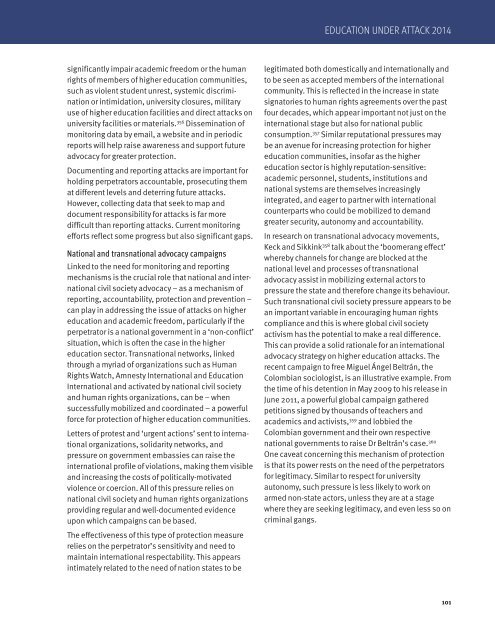You also want an ePaper? Increase the reach of your titles
YUMPU automatically turns print PDFs into web optimized ePapers that Google loves.
EDUCATION UNDER ATTACK 2014<br />
significantly impair academic freedom or the human<br />
rights of members of higher education communities,<br />
such as violent student unrest, systemic discrimination<br />
or intimidation, university closures, military<br />
use of higher education facilities and direct attacks on<br />
university facilities or materials. 356 Dissemination of<br />
monitoring data by email, a website and in periodic<br />
reports will help raise awareness and support future<br />
advocacy for greater protection.<br />
Documenting and reporting attacks are important for<br />
holding perpetrators accountable, prosecuting them<br />
at different levels and deterring future attacks.<br />
However, collecting data that seek to map and<br />
document responsibility for attacks is far more<br />
difficult than reporting attacks. Current monitoring<br />
efforts reflect some progress but also significant gaps.<br />
National and transnational advocacy campaigns<br />
Linked to the need for monitoring and reporting<br />
mechanisms is the crucial role that national and international<br />
civil society advocacy – as a mechanism of<br />
reporting, accountability, protection and prevention –<br />
can play in addressing the issue of attacks on higher<br />
education and academic freedom, particularly if the<br />
perpetrator is a national government in a ‘non-conflict’<br />
situation, which is often the case in the higher<br />
education sector. Transnational networks, linked<br />
through a myriad of organizations such as Human<br />
Rights Watch, Amnesty International and Education<br />
International and activated by national civil society<br />
and human rights organizations, can be – when<br />
successfully mobilized and coordinated – a powerful<br />
force for protection of higher education communities.<br />
Letters of protest and ‘urgent actions’ sent to international<br />
organizations, solidarity networks, and<br />
pressure on government embassies can raise the<br />
international profile of violations, making them visible<br />
and increasing the costs of politically-motivated<br />
violence or coercion. All of this pressure relies on<br />
national civil society and human rights organizations<br />
providing regular and well-documented evidence<br />
upon which campaigns can be based.<br />
The effectiveness of this type of protection measure<br />
relies on the perpetrator’s sensitivity and need to<br />
maintain international respectability. This appears<br />
intimately related to the need of nation states to be<br />
legitimated both domestically and internationally and<br />
to be seen as accepted members of the international<br />
community. This is reflected in the increase in state<br />
signatories to human rights agreements over the past<br />
four decades, which appear important not just on the<br />
international stage but also for national public<br />
consumption. 357 Similar reputational pressures may<br />
be an avenue for increasing protection for higher<br />
education communities, insofar as the higher<br />
education sector is highly reputation-sensitive:<br />
academic personnel, students, institutions and<br />
national systems are themselves increasingly<br />
integrated, and eager to partner with international<br />
counterparts who could be mobilized to demand<br />
greater security, autonomy and accountability.<br />
In research on transnational advocacy movements,<br />
Keck and Sikkink 358 talk about the ‘boomerang effect’<br />
whereby channels for change are blocked at the<br />
national level and processes of transnational<br />
advocacy assist in mobilizing external actors to<br />
pressure the state and therefore change its behaviour.<br />
Such transnational civil society pressure appears to be<br />
an important variable in encouraging human rights<br />
compliance and this is where global civil society<br />
activism has the potential to make a real difference.<br />
This can provide a solid rationale for an international<br />
advocacy strategy on higher education attacks. The<br />
recent campaign to free Miguel Ángel Beltrán, the<br />
Colombian sociologist, is an illustrative example. From<br />
the time of his detention in May 2009 to his release in<br />
June 2011, a powerful global campaign gathered<br />
petitions signed by thousands of teachers and<br />
academics and activists, 359 and lobbied the<br />
Colombian government and their own respective<br />
national governments to raise Dr Beltrán’s case. 360<br />
One caveat concerning this mechanism of protection<br />
is that its power rests on the need of the perpetrators<br />
for legitimacy. Similar to respect for university<br />
autonomy, such pressure is less likely to work on<br />
armed non-state actors, unless they are at a stage<br />
where they are seeking legitimacy, and even less so on<br />
criminal gangs.<br />
101


